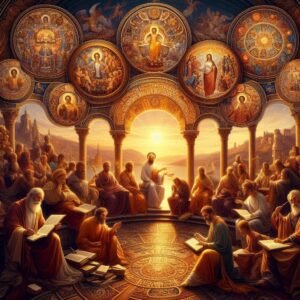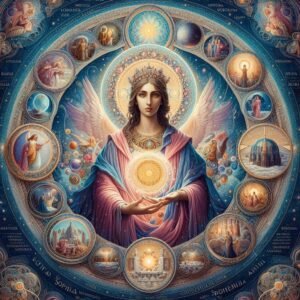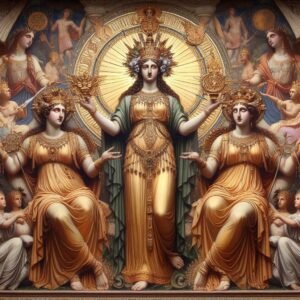
Marcion of Sinope was an influential early Christian theologian who lived around 85-160 AD. He is best known for founding Marcionism, a belief system that distinguished between the vengeful God of the Old Testament and the loving God of the New Testament, whom he believed sent Jesus Christ. Marcion compiled one of the earliest known canons of Christian scriptures, which included only ten Pauline epistles and a version of the Gospel of Luke, known as the Gospel of Marcion. His teachings were controversial and led to his excommunication by the Roman Church around 144 AD.
Marcionism, founded by Marcion of Sinope in the 2nd century, was a dualistic belief system that distinguished between two gods: the vengeful creator god of the Old Testament and the benevolent god of the New Testament, who sent Jesus Christ as the saviour. Marcion rejected the Old Testament entirely and believed that the material world was created by the inferior god. He emphasized faith in Christ’s act of redemption and practised strict asceticism to avoid the corrupt material world. Marcion’s canon included only a modified version of the Gospel of Luke and ten Pauline epistles, excluding any Judaic elements.
Marcion rejected the Old Testament because he believed that the god depicted in it, whom he saw as vengeful and wrathful, was fundamentally different from the benevolent god of the New Testament who sent Jesus Christ. He viewed the Old Testament god as a lesser demiurge responsible for creating the material world, which he considered corrupt and evil. Marcion aimed to separate Christianity from Judaism, emphasizing a new, purer form of faith based solely on the teachings of Jesus and the writings of Paul.
Marcion’s views did not gain widespread acceptance within mainstream Christianity. While he attracted a significant following and his teachings sparked considerable debate, the early Church largely rejected his ideas. Prominent Church Fathers like Tertullian and Irenaeus wrote extensively against Marcionism, condemning it as heretical. Over time, Marcionite communities dwindled, and his teachings were overshadowed by the development of orthodox Christian doctrine.
Marcionism faced several specific criticisms from early Church Fathers. One major criticism was its dualistic view of two gods, which was seen as incompatible with the monotheistic foundation of Christianity. Tertullian, in his work “Adversus Marcionem,” argued that Marcion’s rejection of the Old Testament and its god undermined the continuity and unity of the Christian faith. Additionally, critics like Irenaeus contended that Marcion’s edited canon of scripture, which excluded the Old Testament and parts of the New Testament, distorted the true teachings of Christianity. These criticisms contributed to the broader rejection of Marcionism as heretical.
Marcion responded to criticisms by steadfastly defending his views and emphasizing the distinction between the Old and New Testament gods. He argued that the benevolent god of the New Testament, who sent Jesus Christ, was fundamentally different from the vengeful creator god of the Old Testament. Marcion also maintained that his edited canon, which excluded the Old Testament and certain New Testament writings, represented the true teachings of Christianity. Despite the opposition, he continued to promote his beliefs and established Marcionite communities that adhered to his interpretations.
Marcion’s followers viewed him as a significant and influential religious leader. They saw him as a reformer who sought to purify Christianity by distinguishing it from Judaism and the Old Testament. Marcionites believed that Marcion’s teachings revealed the true nature of the benevolent god of the New Testament, contrasting sharply with the malevolent creator god of the Old Testament. They respected his commitment to what they considered the authentic message of Jesus and Paul, and they adhered to his strict ascetic practices.
After Marcion’s death, his followers continued to uphold his teachings and the Marcionite church expanded significantly. Despite facing opposition from mainstream Christianity and imperial disapproval, Marcionite communities persisted for several centuries. They maintained their distinct beliefs, including the rejection of the Old Testament and the dualistic view of two gods, which set them apart from orthodox Christian doctrine. Over time, however, the influence of Marcionism waned as the early Church consolidated its doctrines and practices.
Unfortunately, none of Marcion’s original writings have survived. Our knowledge of his teachings primarily comes from the works of his critics, such as Tertullian and Epiphanius, who wrote extensively against Marcionism. Marcion’s key texts, like the “Antitheses” and his version of the Gospel of Luke, are known only through these secondary sources. Despite the lack of original texts, the impact of Marcion’s ideas on early Christian debates is well-documented.
Subscribe to our post updates - Don't miss a thing!!







